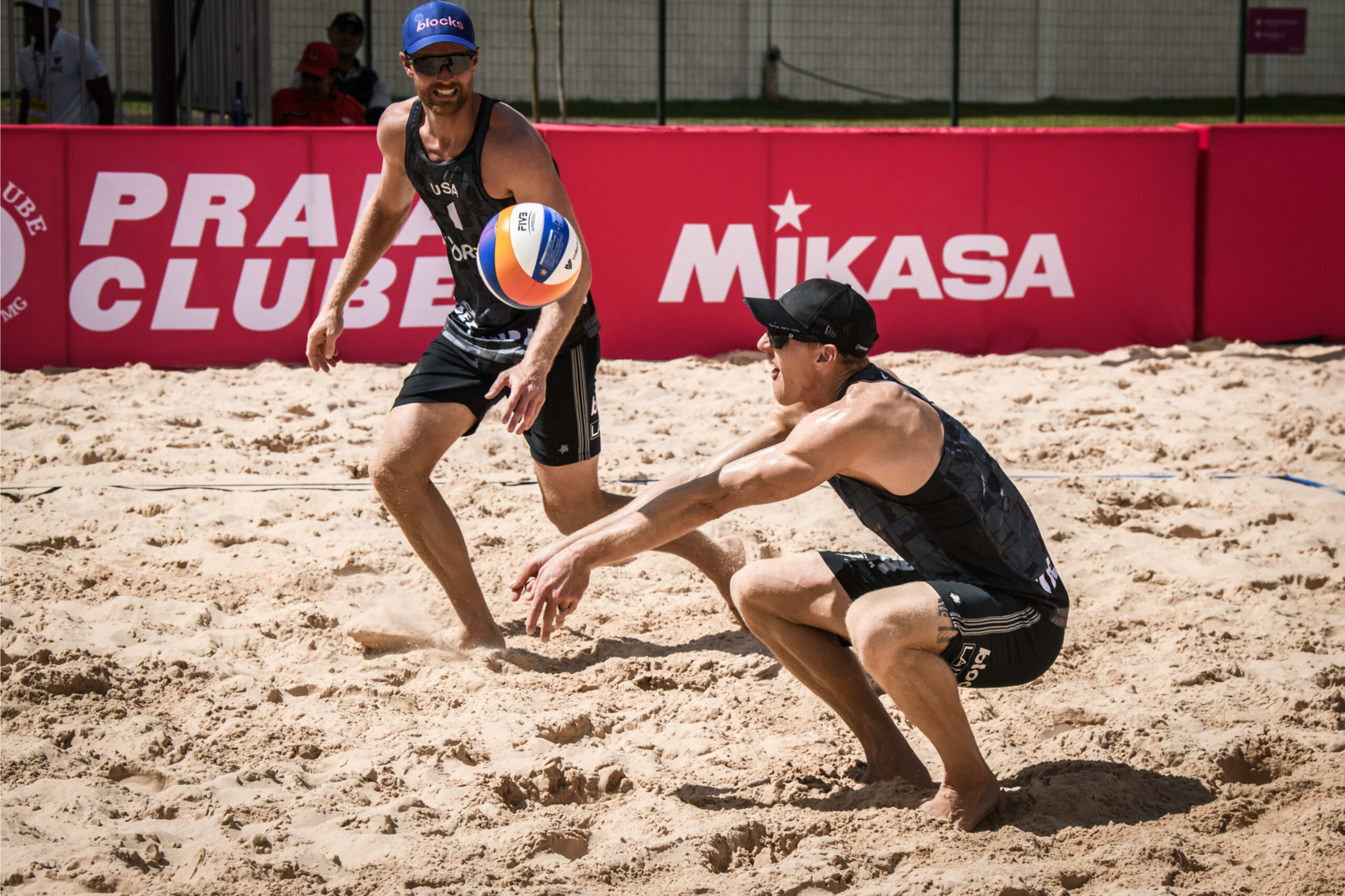
Volleyball Mailbag: Does Tri regret dumping Trevor? AVP streaming; TKN
HERMOSA BEACH, California — After a dismal, 0-3 performance at the World Championships for Tri Bourne and Chaim Schalk, coupled with a fourth-place finish for USA rivals Trevor Crabb and Theo Brunner, it wasn’t hard to guess what the brunt of questions on this week’s mailbag episode of SANDCAST would be centered around: Did Bourne regret his decision this past December to dump Crabb and pick up Schalk?
True enough, nearly half of the questions in our inbox revolved around on that very topic.
“Let me guess,” Bourne said, before I read him the first question, “do you regret your decision?”
He laughed.
But it was fair for the dozens (and dozens) of fans to wonder: Did he?
“No,” he said, leaning back. “I don’t.”
Then he thought for a moment before elaborating.
“I think the thing that people are missing is the why,” he added. “If you do things for the right reasons, then you have to back yourself through the highs and the lows. It’s so easy to look at Trevor playing well and say ‘He’d be playing well with you right now, you’d be in a better position.’ We were just in a place where I needed change. I don’t want to do this anymore the same way, whether it’s bored with it or I want to try new things, I wanted to try and go and take the next step, which is extremely hard to do when you’re at the top level. I hadn’t done that internationally, so I took that risk for the right reasons at the right time. I don’t regret the decision.
“In the future, I want to make decisions the same way. Just because it goes south doesn’t mean it’s the wrong thing to do. It’s a risk no matter what. It would have been a risk staying with Trev as well. But you definitely think about it when Trev’s doing good and you’re not, you’re like ‘damnnn.’ You don’t deny that from your head. You just wear those thoughts while you’re in your lows. For sure this has been the most frustrating, most difficult emotionally, mentally, even physically, just trying to figure it out knowing I put myself in this situation. It’s super difficult.”
At the moment, Bourne and Schalk are No. 20 in the Olympic rankings, four spots behind Crabb and Brunner, though even that gap is deceiving, as Bourne and Schalk have two more finishes to their total. Among the top four USA men’s teams in the race, they are the only team without a medal, and have yet to even make a semifinal. On the AVP this season, Bourne’s prize money was nearly chopped in half from 2022 — he did play two fewer events, but his average per events was more than $2,000 less — and Schalk also saw a similar drop. Internationally, their average finish has plummeted.
Neither player is in denial: It has been an objectively rough season, particularly given their expectations. At the beginning of the year, they were widely considered to be the top men’s USA team. Now they’re scrambling to simply remain on the USA Volleyball stipend, given to the top 12 players in the federation. This weekend’s Challenge event in Haikou, China, is bigger than most realize, with implications far beyond movement in the Olympic rankings.
There have been glimmers, signs that an elite team is in there somewhere: A fifth at the Uberlandia Elite16, three tremendous matches with the Czech Republic, Germany, and Sweden in Tepic, a win over Alex Brouwer and Robert Meeuwsen. It is a matter of making those performances sustainable, with both Schalk and Bourne playing at a high level at the same time, something that has occurred sporadically, and never during an entire tournament.
As far as regret, however, Bourne says he doesn’t have any. He liked the process by which he made the decision.
They now have eight months left to make it the right one.
Tri Bourne passes a ball at the Uberlandia Elite16 while Chaim Schalk prepares to set/Volleyball World photo
Why doesn’t the AVP use YouTube for broadcasting?
Bet The Beach
As we mentioned on the podcast, we’ve tried to get someone on the AVP on for as long as the show has been going — today marks our six-year anniversary, so today makes it six years of futility in that regard — but there hasn’t been interest. So this answer is only our best speculation. As a general rule of thumb, however, anytime there is a question in this realm, the answer is almost always money.
That’s the prism we’ll use to answer this question. Given that lens, the numbers just don’t make sense.
On average, YouTube pays roughly $6 per 1,000 viewers, which is also the generally accepted rate for advertisers on television as well. The women’s finals of the 2022 AVP Chicago Gold Series, when it was streamed on YouTube, amassed 49,000 viewers and the men hit 61,000. In Phoenix, the numbers were even lower: 30,000 for the women, 60,000 for the men. Taken all together, Phoenix hit 394,000 views for the entire tournament.
You don’t have to have a math degree to understand that those numbers don’t work well for the bottom line when subtracting the revenue from the production and talent costs, which can be substantial when producing a stream for, say, ESPN+.
The quandary smaller sports like beach volleyball find themselves in is that they also don’t work for linear television, either. A time buy on NBC or ESPN would also be a financial loss, and it would also — and did in 2023 — tick off fans who couldn’t watch it live and also couldn’t go back and find the replays.
Streaming and television is a far more complicated situation than fans give the AVP credit for. Volleyball World was brilliant in packaging beach with indoor on VolleyballTV, but the AVP doesn’t have that luxury, as it doesn’t have an app, nor does it have an indoor partner (it could partner with VolleyballTV, something I think most fans would love, but how the financials would shake out, I’m not sure).
What’s the solution?
There isn’t one.
To borrow a phrase from economist and author Thomas Sowell: “There are no solutions, only trade-offs.”
When Steve Obradovich ran the inaugural Newport Beach Volleyball Invitational a few weekends ago, he initially wanted to stream it. The McKibbin brothers advised him against it, instead pushing for a higher quality post-produced product at a fraction of the cost that would, in actuality, get more views than if they streamed it live. Their first video had 41,000 views in its first six days — more than every women’s AVP final that was streamed live on YouTube in 2022, matches that have had more than a year to gain views.
With viewership of a post-produced product likely to surpass that of a live audience, at a fraction of the cost, what are the tradeoffs? For one, sports are one of the last bastions of television where it’s critical to watch it live. You can miss every season of Game of Thrones and it doesn’t matter; you can just binge it when you want. Even if you’ve been exposed to spoiler alerts, it doesn’t ruin the show (this is exactly what I did). But if you know the results of the Manhattan Beach Open before it was televised — as many did, given the tape-delayed nature of the televised product this year — there is little incentive for the casual fan to tune in. The superfans are still likely to watch, they’ll still want to know how the results came to be. But the trade-off in a delayed stream or video is that a huge chunk will shrug it off and not watch. There’s also no chance the McKibbins, or whoever, could produce every match throughout a tournament; at best, they’d cover the semifinals and finals, along with maybe the highlight match of the first few days.
What the post-produced matches might do, however, is add further incentive for fans to actually show up to tournaments. If the only way to watch the sporting event live is to attend in person, it’s possible the attendance would see a significant boost. This could potentially mean more revenue on merchandise sales, more eyeballs for the sponsor village, more VIP sales, and ultimately a better aesthetic for photos and videos to pitch to future advertisers and sponsors.
It would be a better look than the relative ghost-town that was much of New Orleans or Miami (the night matches in New Orleans, however, were positively electric, but the finals were dismal in attendance).
Is that a guarantee more fans would show up? No, but I’d bet on it. And I think beach volleyball is actually one of the few sports remaining where it’s better to watch in person than it is on television.
Would people be upset if this were the path taken? Of course. But people will be upset regardless of what the AVP does with its streaming and television options, so it all really boils down to what tradeoffs the AVP is willing to make.
What’s important for fans to know, however, is that, as Sowell said, there are no solutions.
Only trade-offs.
Maddison McKibbin captures video at AVP New Orleans/AVP photo
Any scenarios where USA gets three women’s teams in the Paris Olympics?
LC Delco
No. Sorry. I’d love it if it were possible and Betsi Flint and Julia Scoles could then compete in Paris, but there are zero scenarios in which this can happen.
When Kelly Cheng and Sara Hughes won the World Championships, that did not open up another bid for the USA; it only guaranteed one bid for the USA, and that bid isn’t even technically guaranteed for Cheng and Hughes. USA can theoretically send whomever it wants. Each team can only account for one bid. So if Cheng and Hughes qualify on points and winning World Championships — which is almost a certainty at this point — they can only use one of those bids. The other will trickle down to the 18th ranked team in the Olympic rankings.
Why don’t more teams promote themselves as well as TKN?
Justin Payne
Kristen Nuss and Taryn Kloth do a wonderful job promoting themselves. They have their own Instagram page. They sell merch. They just started the most perfectly named podcast: Small Talk & Tall Tales.
More than anything, however, they have two things many teams don’t: A unique identity, and a whole lot of wins.
They are the only top team who has remained in Baton Rouge, Louisiana. Everyone else, talented as they may be, is a bit identity-less, all lumped together as just another team in Southern California. The south loves their sports, and the Louisiana community has rallied around Nuss and Kloth as if they were the Saints or Pelicans or LSU Tigers which, of course, they are. They play up the role of southern belles well, extraordinarily competitive while remaining the polite, charming women they are.
They’re unlike anyone else in the USA.
Thing is: They could have the identity and the podcast and the merch and the vibe and none of it would matter if they didn’t have the wins. As Kent Steffes likes to say: “Winning solves a lot of problems.”
Winning is the greatest promotional tool there is. If they were losing, it’s not hard to look into the minds of fans. Many would look down upon their promotions as being grandiose, a bit big for their britches. Who are they, a middling team, to be selling merch? What are they thinking, staying in Louisiana? That’ll never work! They need to join the top teams in California! It’s the only way!
See what I mean?
Winning is the ultimate promotion. Just look at how the narrative shifted around Trevor Crabb. For years, he was #NeverTrevor, because he was the king of self-promotion without the wins to back it up. Now he’s #ForeverTrevor.
He hasn’t changed.
His record has.
And that’s changed everything.
Kristen Nuss jumps into the arms of Taryn Kloth after winning World bronze/Volleyball World photo
The post Volleyball Mailbag: Does Tri regret dumping Trevor? AVP streaming; TKN appeared first on Volleyballmag.com.
Read More Volleyballmag.com Beach, Olympics Beach, Pro Beach


